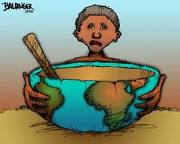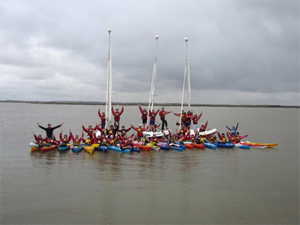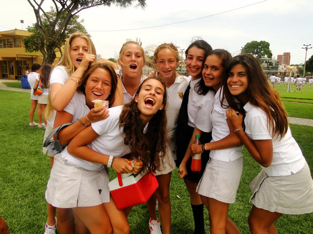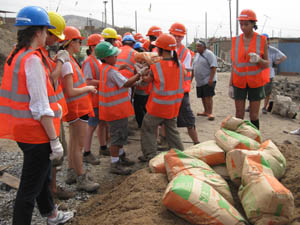 One of my most powerful memories from my grade seven year at LCC was an event planned by Grad Pride called, “The World at Lunch.” We had been told that instead of having our 5th and 6th period classes we would be going to the Velan Gym for a special event. Upon entering the gym, my hand was marked with a red dot and I was told to sit down at a table at the back of the room. A few other students from different grade levels soon accompanied me—around 12 students. Roughly four or five times as many students were marked with blue dots and told to sit at separate tables along the sides of the gym. The majority of the students sat on the floor in the middle of the gym. The sounds of periodic snapping could be heard, approximately every three seconds. Among the crowd could be heard a distinct sense of confusion and wonder to the meaning of such an odd procedure. We were soon told that the select students sitting at my table, represented first world countries and that we would be served a three-course meal. The blue tables represented second world countries and they would be eating pizza. As for the rest of the students, they inevitable represented the majority of the human population; the third world countries, and they would be served rice and dyed water. It was only later that we discovered that the periodic snapping that rang in our ears was the representation of a single child dying due to lack of food, resources, care and money.
One of my most powerful memories from my grade seven year at LCC was an event planned by Grad Pride called, “The World at Lunch.” We had been told that instead of having our 5th and 6th period classes we would be going to the Velan Gym for a special event. Upon entering the gym, my hand was marked with a red dot and I was told to sit down at a table at the back of the room. A few other students from different grade levels soon accompanied me—around 12 students. Roughly four or five times as many students were marked with blue dots and told to sit at separate tables along the sides of the gym. The majority of the students sat on the floor in the middle of the gym. The sounds of periodic snapping could be heard, approximately every three seconds. Among the crowd could be heard a distinct sense of confusion and wonder to the meaning of such an odd procedure. We were soon told that the select students sitting at my table, represented first world countries and that we would be served a three-course meal. The blue tables represented second world countries and they would be eating pizza. As for the rest of the students, they inevitable represented the majority of the human population; the third world countries, and they would be served rice and dyed water. It was only later that we discovered that the periodic snapping that rang in our ears was the representation of a single child dying due to lack of food, resources, care and money.
It was only a fluke that I had been chosen to sit at the first world countries’ table. I couldn’t fathom the reasoning behind it. Why me? Why had I been chosen? Why was it fair that I lived a life of surplus in Canada and not others? Listening to the guest speakers, hearing devastating facts, and being tormented by that ever-lingering series of snaps, a single question rang in my mind: what could I do to help? The money that would be gathered from the upcoming free dress would be designated to helping children living in poverty. Even knowing that the school was making an effort to help such a great cause, I somehow felt personally connected, I felt like I wanted to do more than donate the mere $2 and move on. For that free dress I had gathered over $100 to donate to the organization. It seemed as if I was not the only person who was touched by this assembly and many students decided to bring more than the required minimum. Perhaps it was a sense of guilt that compelled us to bring more. However, I would like to think that a sense of widespread community was felt that day.
The Grad Pride of grade 11 chose to hold a “World At Lunch” this year that took place on Friday, March 25, 2011. We felt that it was our responsibility, being the last year that would have experienced the initial “World At Lunch,” to share with the rest of the school the event that, for many of us, allowed us to truly feel a sense of global identity and responsibility. One of the major values that LCC tries to pass onto its students is the sense that, due their luck in having been born in such a great country, it is their responsibility not to turn their back on the majority of the people in the world that find it hard to live day-by-day with the money and food that they have. It is our responsibility as a prosperous community, to look out into a world where people struggle to get by and realize that we have the potential to, in some way, improve their standard of living. It would be unrealistic to think that this single event would drastically have any major impact on child poverty or human rights, however the point of this event isn’t to make a single change. The reason behind the event is to allow students to begin wondering about their role to play in a world that they are just beginning to discover.—Noah Schouela ’11




